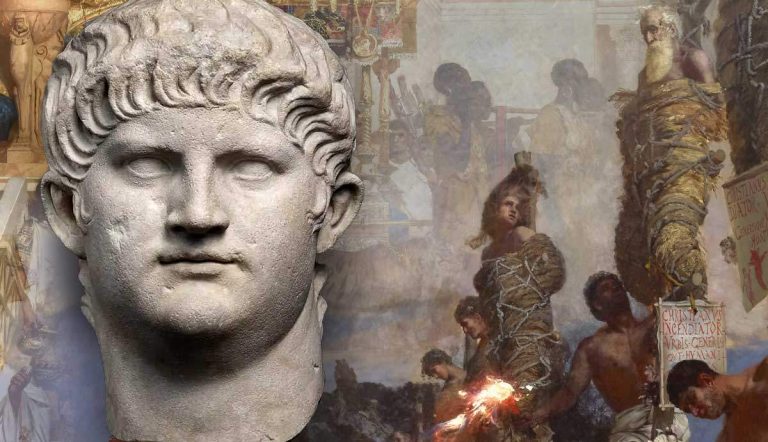
One of Emperor Nero’s most infamous acts was his persecution of Christians. If sources are to be believed, this was the first empire-wide attempt to suppress Christianity, which was still a young religious sect in the mid-first century. However, in the eyes of the Roman authorities, Christianity threatened the established order and the pagan pantheon. Furthermore, Nero had to appease the victims of the great fire of Romeand problematic Christians made excellent scapegoats.
Thus, Christians were subjected to cruel and humiliating punishments, ranging from burning alive to crucifixion. Nero is also said to have executed the most prominent Christian leaders, Peter and Paul. However, modern historians question the extent of the persecution, as early Christian writers exploited the event to glorify the martyrs and vilify the name of Nerotransforming this average autocrat into nothing less than the Antichrist.
Emperor Nero blamed Christians for the Great Fire of Rome

One of the most tragic events of Nero’s controversial reign was the Great Fire of Rome, which broke out in July 64 CE. The fire raged for six days, devastating the capital and leaving most of the population homeless. Nero did his best to help the victims and enforced strict fire and building regulations to prevent further disasters. However, the emperor’s enemies, including the Senate of Rome, jumped at the opportunity. blame Nero for starting the fire, or at least let the city burn, to make way for his grandiose construction projects. Nero also faced public anger when he began building his lavish palace. Domus Aurea – while the ashes were still hot.
The solution was a small, rapidly growing religious sect, following the teachings of a rebel from Judea, whom his followers called Christ. As Christians did not recognize the traditional Roman pantheon and disrespected Roman authorities, they provided an ideal scapegoat.
Nero began the persecution of Christians in Rome

Get the latest articles delivered to your inbox
Subscribe to our free weekly newsletter
According to Tacitus, our primary source, Nero used the Great Fire of Rome to launch a violent persecution of Christians, a sect already unpopular and distrusted by many Romans. The authorities arrested the suspects and tortured them in the worst possible way. The people loved extravagant shows, like chariot racing or gladiator fights. So, Nero decided to make Christians a form of entertainment to appease the masses. The Christians were thrown to the beasts in the great amphitheater or burned alive like human torches. He also ordered that Christians be crucified so that they could imitate their savior, Jesus Christ. Crucifixion was generally reserved for the worst criminals. Thus, Nero used Christians to strengthen his authority. the Roman emperor. The persecutions create an atmosphere of terror, forcing Christians to live in the shadows and to practice their faith in complete discretion, deep in the catacombs of the capital.
Saint Peter and Paul died during the persecution

Among the many victims of persecution were two of the most influential figures of the early Christian Church: Saints Peter and Paul. Both were apostles of Jesus Christ, who traveled the Roman Empire after his death, preaching and spreading the Gospel. According to the New Testament, Peter was crucified upside down at his own request because he was unworthy to die in the same way as his Lord. As a Roman citizen, Paul was entitled to a less painful death and was beheaded.
After Christianity became the official religion of the Empire under Theodosiusthe bishop of Rome took advantage of the martyrdom of Saint Peter to establish himself as one of the outstanding figures of Christianity: the pope.
Christianity threatened the authority of the emperor

Our two main sources on persecution, Tacitus and Suetonius, shared the view that, for Roman authorities, Christianity was a threat to the established order and the authority of the emperor. As a monotheistic religion, Christianity encountered polytheistic and syncretic Roman religion, which tolerated and incorporated many diverse gods and cults. Worse still, Christianity refused to participate in the imperial cult, which venerated the emperor as god and protector of the Roman Empire.
In Nero’s eyes, the exclusivity of Christianity and the rejection of the traditional pantheon offended the Roman gods, thereby endangering the divine favor and prosperity of his empire.
The persecution of Nero was a turning point for Christianity

Unfortunately, contemporary sources for Nero’s persecutions are nonexistent. Tacitus and Suetonius lived decades after The death of Nero. The next important author – Tertullian – lived in the third century, while the most detailed reports, including the account of the martyrdom of Saints Peter and Paul, date from the fourth century – when the Roman Empire was abandoning its pagan past and embracing Christianity. In these troubled times, under the reign of Constantine the Great, the now official religion had to create its own identity. And Nero, a reviled pagan emperor, was an excellent target.
Additionally, Christian authors, such as Eusebius, might inflate the extent of Nero’s and subsequent persecutions, such as the persecutions under Emperor Diocletianto strengthen the position of Constantine and his new Constantinian dynasty.
Emperor Nero became the Antichrist

The martyrdom of Peter and Paul elevated their status within the Christian community, transforming them into revered figures and making Rome one of the major centers of Christianity. It also shaped Christian belief. The faithful now eagerly await the resurrection of the dead and the heavenly reward bestowed by the martyrs, who would reign with Christ in the new Jerusalem. The persecutions that followed only reinforced the belief that the end times were near and final judgment was imminent. Many have identified Nero with none other than the Antichrist, the beast or dragon featured in the Book of Revelation, written shortly after his reign.
Ultimately, Nero’s persecution, regardless of its scale, greatly contributed to the development of Christian theology and strengthened the resolve of the early Christian community, becoming a turning point for Christianity and giving Nero the role little flatterer of the Antichrist.


